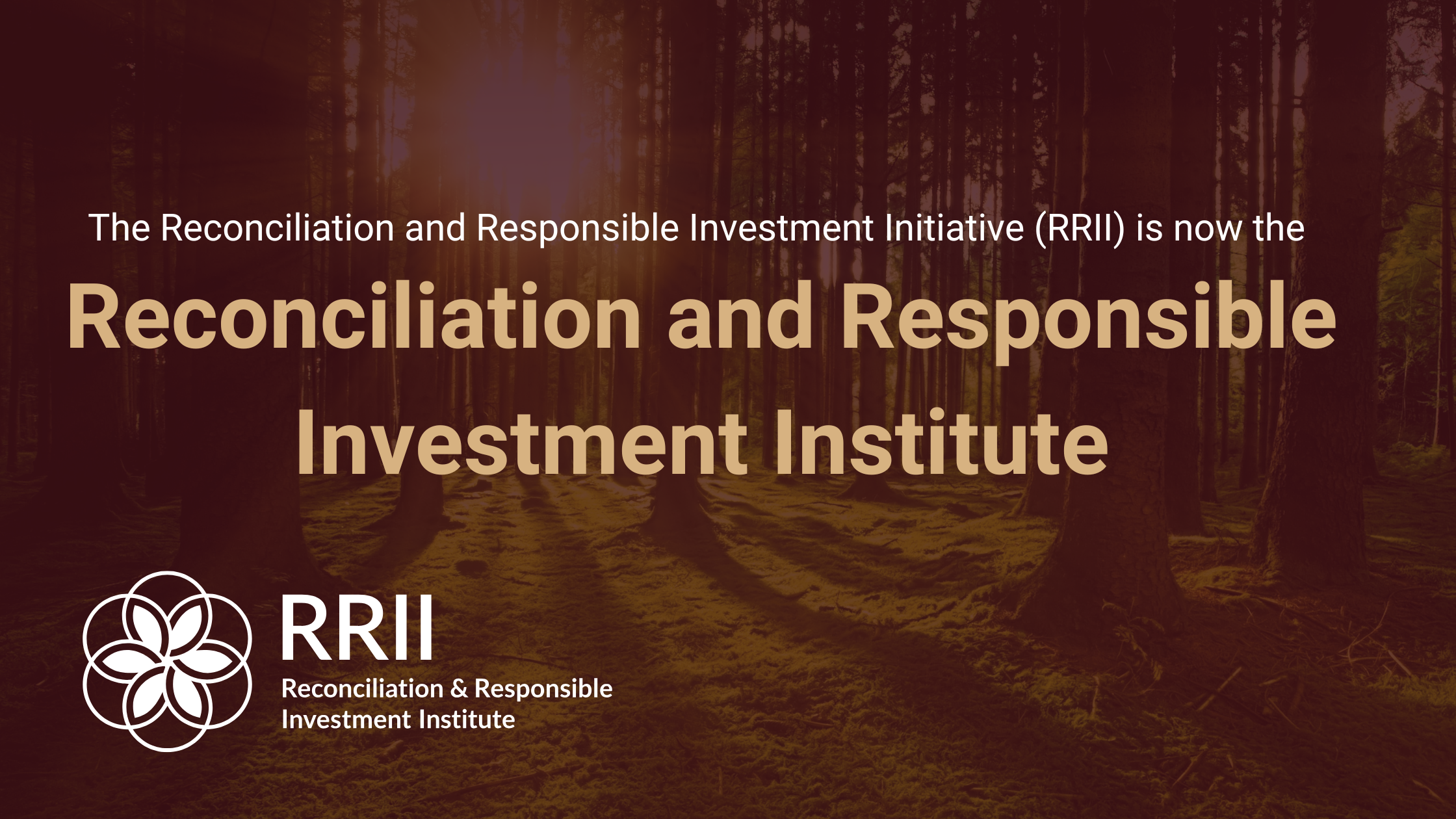30 March 2021 – By Katie Wheatley, Manager, Reconciliation & Responsible Investment Initiative, SHARE and Lindsey Walton, Head of Canada for Signatory Relations, PRI
Cross-posted with permission from the PRI blog.
Canadian businesses must support Indigenous communities in securing long-term, sustainable benefits from economic development, as part of their reconciliation duties, enshrined in the Truth and Reconciliation Call to Action #92. Creating opportunities for equity ownership and participation are significant steps in this process, and responsible investors have a role to play in encouraging these.
The Indigenous economy in Canada continues to grow, but remains largely untapped. Indigenous peoples contribute over CAD 30 billion annually to Canada’s GDP, according to the Business reconciliation in Canada guidebook. This is expected to increase three-fold to CAD 100 billion by 2024.
While many companies have made great strides towards reconciliation, many more are still missing the mark. According to a recent report by SHARE, few companies have disclosed formal commitments to upholding Indigenous rights.
Fostering reconciliation and Indigenous economic growth
The PRI recently co-hosted a session with SHARE at its 2021 Investor Summit on growing the Indigenous economy.
The session began by discussing recent legal reforms, with panellists highlighting that Indigenous rights already exist but are now being affirmed by legislative amendments like section 35 of the Constitution.
“These affirmations don’t create rights; those rights already existed.” – Merle Alexander, hereditary chief of the Tsimshian Nation, member of the Kitasoo Xai’xais First Nation and Principal, Indigenous Law Group at Miller Titerle & Co
British Columbia became the first province to put the United Nations Declaration on the Rights of Indigenous Peoples (UNDRIP) into action through legislation in 2019. The Canadian government endorsed UNDRIP and committed to its full and effective implementation in 2016, though it didn’t introduce actual legislation until December 2020 through Bill C-15 – the United Nations Declaration on the Rights of Indigenous Peoples Act. If passed by Parliament, it will provide a roadmap for the government and Indigenous peoples to work together to fully implement UNDRIP federally.
For businesses – and investors – these legal affirmations to uphold rights should represent a minimum standard that encourages, rather than limits, more ambitious action. The following examples from the fishing and renewable energy industries demonstrate how recognising Indigenous rights can foster bold, mutually productive partnerships between companies and Indigenous communities.
The Mesgi’g Ugju’s’n wind farm
The Mesgi’g Ugju’s’n wind farm in Quebec is a partnership between independent renewable power producer Innergex and three Mi’gmaq communities. It was initiated in May 2013, when the Government of Quebec allocated 150 MW of wind power to the Mi’gmaq communities, which had historically been excluded from participating in local development opportunities. More than 300 workers were engaged in the development and construction of the wind farm, including 110 Indigenous workers. The project is expected to generate profits of approximately CAD 200 million over a 20-year period for the Mi’gmaq communities.
“We wanted to have a 50/50 ownership stake where we didn’t even have any dollars to put into it, we didn’t have the equity – but we had the project, we had the resources, we had the wind, and we had the land.” – Terri Lynn Morrison, a member of the Mi’gmaq First Nations in Listuguj, Quebec and Director of Strategic Partnerships and Communications at Indigenous Clean Energy
The Clearwater Seafoods acquisition
In 2020, a coalition of Mi’kmaq First Nations partnered with Vancouver-based Premium Brands Holdings to jointly purchase one of North America’s largest seafood companies, Clearwater Seafoods, for CAD 1 billion. The Mi’kmaq communities own 50% of Clearwater Seafoods and hold the company’s Canadian fishing licenses within a fully Mi’kmaq-owned coalition.
“The Clearwater Seafoods transaction with Premium Brands is interesting because it takes place in an industry that investors don’t typically think of in terms of the financial materiality of reconciliation […] – the Mi’kmaq get ownership of a high-quality, long-lived, cash-producing, intergenerational asset. Our analysts expect the deal to provide a return of over 15% on invested capital [in Premium Brands].” – Mark Fattedad of Jarislowsky Fraser, a PRI signatory and Premium Brands shareholder
The transaction came against a backdrop of historic tensions between Indigenous and non-Indigenous fishers, which had resurfaced a few months earlier when members of the Sipekne’katik First Nation in Nova Scotia opened a self-regulated inshore lobster fishery. This was an exercise of their treaty rights, as affirmed by the Supreme Court of Canada in 1999. They did so before the fishing season opened for non-Indigenous fishers, who responded aggressively, leading to civil unrest. As explained in this article, partnerships such as the Clearwater Seafoods acquisition can help to shift the perception of the Indigenous community from solely being holders of treaty rights to being economic partners.
Lessons for investors
Investors should encourage these kinds of equity partnerships, alongside supporting Indigenous participation in investee companies’ operations and governance. Fostering further partnerships between Indigenous peoples and public companies has the potential to create value for all parties and would go a long way towards facilitating reconciliation and ensuring that Indigenous people can exercise their rights to economic self-determination.
Investors have a responsibility to respect human rights, including the right to self-determination, in their investment activities. This responsibility is outlined in recognised standards and ideals that codify social sustainability, such as the UN Guiding Principles on Business and Human Rights and OECD Guidelines for MNEs. The PRI’s position paper, published in October 2020, outlines investors’ three-part responsibility to respect human rights, through their policy commitments; due diligence processes; and by enabling or providing access to remedy.
These Indigenous partnership examples have shown that by putting people at the heart of investments, investors can retain their social licence to operate and avoid risks to people and their portfolios.
Additional resources for investors
Asset owners can ask their investment managers the following questions regarding Indigenous relations and reconciliation:
- Where in your portfolio do you see material risks or opportunities in relation to Indigenous rights? How do you monitor these, and can you provide specific examples?
- Can you share your proxy voting records on votes related to Indigenous rights and reconciliation, including supporting rationale?
- How does your firm engage with Indigenous organisations? How do you train or build capacity on Indigenous rights and culture in your organisation?


